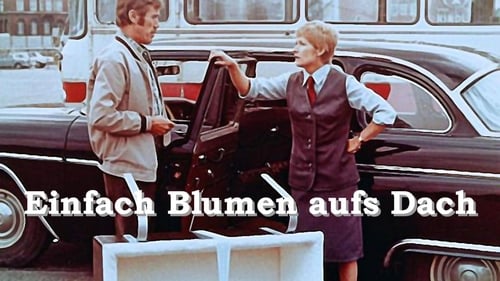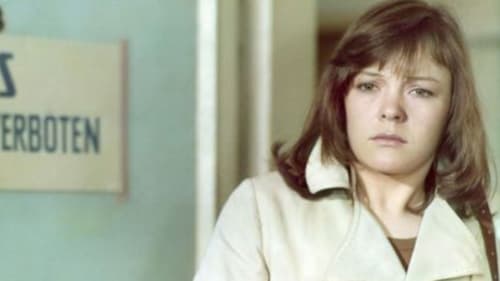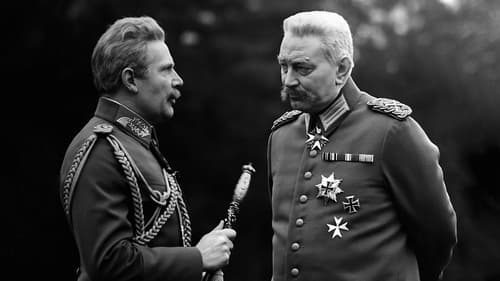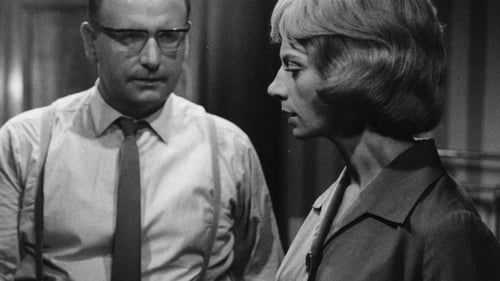Werner Godemann
Nascimento : 1924-03-25, Satow, Deutschland
Morte : 2010-11-28

Pastor Himmelsknecht

To gain lands from the prince of Saxony, a group of orphans seeks Mozart, in order to obtain the very rare score of one of his compositions.

He could have had women, he could have climbed the ladder of his accountancy career, and he could have stood on the podium next to the highest in the land. If only he had wanted to! But Farssmann, shaken by divorce and unwilling to better himself, wants to remain what he is: an ordinary bookkeeper like you and me. And so the dollar deal with Mr. Osbar from Utah (USA) is not the first time he comes into conflict with the very palpable unreality of a country called the German Democratic Republic.


Seven-year-old Kati is glad that despite her spastic disability she is allowed to attend a normal school. Her parents made that possible. In her first year there, she is supposed to prove that she can get along at the school and she does her utmost to keep up with her classmates. Her disability, however, is greeted with constant mockery and disrespect. Even her teachers have a hard time treating her equally. When Kati fails math, she has to attend a special school. Katie is devastated but her friends help her to cope with the new situation.

Milder König
In a king's kingdom there is a forest so dangerous that every man who goes into it is never heard from again. Iron Hans, who is responsible for the deaths, is found at the bottom of a lake and locked up in the king's palace

This biographical film is set in 1937, with Fallada suffering the effects of living under a microscope. The film details his decline, as he is intermittently imprisoned and threatened in order to motivate him to write for the Fatherland. Even the attention of his kind, patient wife and loving children begin to feel oppressive to him. This is one of the few films to take a serious, in-depth look at the tribulations of a creative artist pulled in all different directions by the real world.

A story spanning three generations, from 1871 to 1945. When Gustav Wengler, a farmer’s son, returns from the Franco-German war in 1871, he goes to work for a precision mechanics and optical company, where he soon becomes a master craftsman. Wengler loyally promises the owner on his deathbed that his sons and grandsons will also stand by the company.

A teenager is found murdered, and the examining doctor recognizes her son's knife. The film works its way back to reveal how this situation came about; a rare treatment of the taboo subject of youth criminality in Socialist society.

Everything changes for fifteen-year-old Heinz Stielke, a fanatical member of the Hitler Youth, when he learns that his father, who died as a war hero, was actually Jewish. Heinz is forced to leave school, loses his friends, and worst of all, his mother dies in a bombing raid. A kind-hearted police officer tries to get him a place at an orphanage in Thuringia, but on the way there, he is picked up by the SS and sent to a training camp.


1942. The members of the Voß family, mother, two daughters, a daughter-in-law, and a son-in-law, are living in a house at the river. A fellow soldier of son Paul, who fights at the eastern front, delivers his greetings and an embroidered Russian blouse for Emmi, Paul′s wife. Daughter Agnes, whose husband is also fighting in the war, receives a fur vest from the junior partner who is stalking her. Obviously, the vest is also loot from the eastern front. When the family receives news that Emmi′s husband has been killed in action, the war finally enters the house at the river. Emmi commits suicide while Agnes′s husband returns as a cripple from the war front. At home, he has to learn what a price his wife had to pay for the "Russian fur".

Film by Roland Oehme.

Ten days in the life of socialist politician Clara Zetkin. In August 1932, she is summoned from Archangelskoje near Moskow to open the new legislative session because at seventy-five, she is the oldest representative in the German Reichstag. Although she is ill and almost blind, she see this as her chance to make her voice heard amid the growing Nazi influence in Germany.

Steffens

Goldammer

Film by Bernhard Stephan.

Mechanic Hannes Blaschke and his wife Maxi, who works as a bus driver, have just become happy parents of twins. Now they have a serious transportation problem: Their Trabant is far too small for the grown family that furthermore includes two sons and a dog. Thanks to the support of a state secretary and of his brigade, Hannes acquires a Tschaika – a limousine that is normally restricted to representational purposes – for a small price. Whereas Maxi views the state carriage only as a useful means of transportation, Hannes enjoys the unusual pre-emption he is receiving for the spectacular car. Hannes, who normally is just a humble guy, starts to grate his colleagues with his new affectations. Thus, they teach him an effective lesson: They decorate the state carriage with flowers and thus bring Hannes back down to earth in a humorous way.

Brigadier
Scenes from an East German marriage. A young couple, Sonya and Jens, are very much in love; they get married and have a child. When Sonya wants to go back to work after her maternity leave, they clash for the first time; Jens insists that she remain a full-time wife and mother. Until Death Do Us Part turns an actual police report into a gripping drama, as the director explores the depths of his characters' emotions, driving the conflict to a catastrophic climax.

Kaderleiter Berwinkel
When he reaches age 18, Peter is released from the children's home where he grew up, but this does not mean he is truly ready for adult life.

A flamboyant comedy about love, work and money—revealing that the "planned" economy produced some unconventional entrepreneurial methods.

Ferdinand
The former athlete Barbara follows her husband to the province and attempts to masters her new life, even after her separation from him.

October 1918: Karl Liebknecht is released from prison and Berlin workers celebrate his release. Although WWI is almost over, the German Kaiserreich in vain sends its last reserves to the slaughter. The working class is in a rebellious mood; the uprising of Kiel’s sailors against war and militarism sets off a call for revolution led by Liebknecht. On November 9, Liebknecht declares the Free Socialist Republic of Germany. But pro-Kaiser military and right wing Social Democrats oppose him.

When 17-year-old Angelika moves to Leipzig, she is forced to rent a room at Mrs. Häublein’s for a start, since her parents will not follow until a few months later. Fellow tenant Thomas, a philosophy student, is not at all enthused about his new, pretty housemate. Because of Angelika he has to move into a smaller room. Furthermore, he is annoyed at her many male acquaintances, without sensing that his aggression might be prompted by jealousy. When Angelika’s father comes for a visit, he asks Thomas to keep an eye on his daughter. Thomas takes this assignment very seriously and finally realizes that he has fallen in love with Angelika.

Film by Claus Dobberke.

Denkmalspförtner
Stasi agent Alexander Berg has to uncover a plot of sabotage.
















